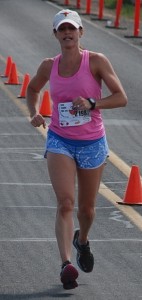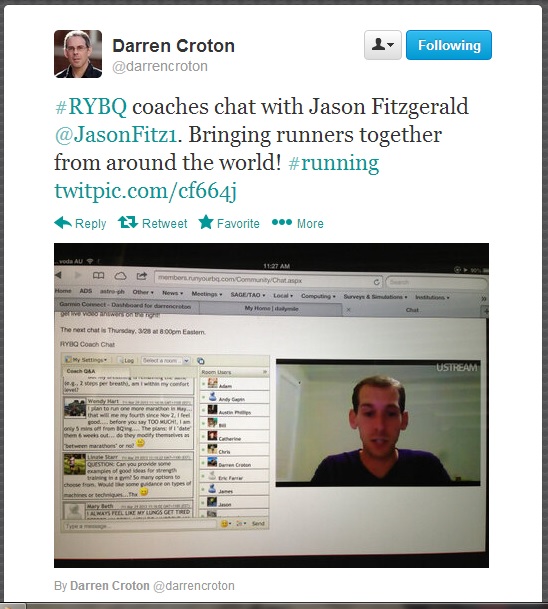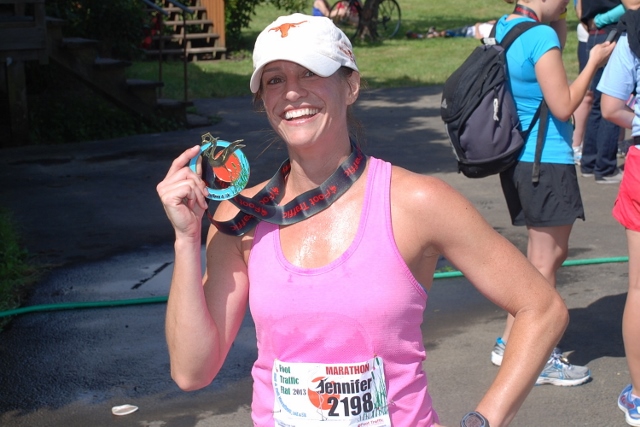The marathon is a fickle beast. Even with good training, you never know what will happen (especially in the final 10k).
Some runners hit the wall. Others cramp up. And a few develop overuse injuries that prevent them from even finishing.
But imagine you’re not one of those runners. How would it feel to negative split the final few miles? Or run a new PR by nearly 40 minutes (in only your second marathon)?
That’s exactly what Jennifer did, a Run Your BQ member who ran her personal best at this years Foot Traffic Flat Marathon in Oregon.
How are people like Jennifer (and Rob and Darren) able to accomplish such large personal records with virtually no injuries?
For starters, smart training! You can’t fake marathon success: hard work is required.
Today I want to share the lessons Jennifer learned from her journey. She started as a very average runner – and now she’s mere minutes away from her Boston Qualifying time.
What impresses me about her improvement is that she was already a consistent runner with good training underneath her. Even though she was doing most things right how was she able to improve by another 40 minutes?
Jennifer’s Marathon Mistakes (and how she fixed them)
Before she joined Run Your BQ, Jennifer descried her training as “pretty solid.” She had run a marathon and a lot of half marathons before she PR’d at her most recent race.
But she made some classic mistakes like not running enough and starting her first marathon too fast for her ability level. She paid the price.
Jennifer said she was a member of a different online training group before RYBQ. Even though she said it was “fine” she was looking for something more in line with the type of training she wanted to do. She told me:
The other training group didn’t have all of the “bells and whistles” that RYBQ did. I am very into the injury prevention aspect of training, and RYBQ is all about it. I had something to do and focus on no matter where I was in my training.
I did a lot of my prior training on a treadmill because there were many tempo runs that I didn’t think I could do outside. I think my former training was too technical and monotonous. I just needed somebody to say “marathon pace,” “tempo pace” or just a basic understanding of knowing my effort level.
With RYBQ, all of the training dots connected perfectly for me (and my pace was getting faster!).
After joining, she made several smart changes to her training that allowed her to make significant improvements in her fitness level.
At a Coach’s Chat webinar, she was able to ask specific questions about her current running and get live responses from me and Matt Frazier (my partner on the RYBQ community) so she knew exactly what to improve.

Plus, she got to hear Matt make fun of me and my jokes about my “gym pump.” Priceless.
And my coaching advice wasn’t always the obvious stuff like “run more” – a specific suggestion I gave to Jennifer was to run without music during her long runs. She remembers:
Jason said I needed to run without music on some of my long runs and I had a hard time letting that iPod go. Now, I can’t imagine running with music. I’m in tune with my form and pace…and I’m not bored!
Mimicking the specific race conditions of the marathon is important not just from a physical perspective, but also from a mental perspective. Learning to be conscious of your form, pace, breathing, and the environment around you is critical for marathon success.
Upgraded Training (and better recovery)
Jennifer had the difficult task of training through the hot Texas summer – no easy feat!
But with so many other RYBQ members in the community forum giving her practical advice on how to train through the heat (or just saying they were equally hot and frustrated), she felt better knowing she wasn’t alone.
The power of a 500+ member community who’s just like you, supporting you through difficult times, can’t be ignored.
Alas, other runners can’t run for you. But that didn’t matter – Jennifer nailed her training:
This time around, I followed my training plan to a “T.” I think I missed one short run the entire time. All of my splits were becoming more and more negative. I could feel the training was solid. I was a little sore the day after the long runs, but overall very healthy and my joints and ligaments felt strong!
RYBQ corresponded with the training technique I wanted to implement: log the miles, protect the body.
Using the text, audio, and video lessons in Run Your BQ, Jennifer improved her form and increased her cadence to become a more efficient runner. But that wasn’t the only benefit that helped her run such a huge personal best.
More importantly, she stayed healthy throughout the entire training cycle. She was injury-free during both her training, the marathon itself, and her post-race recovery.
I found it interesting when she told me:
I ran part of the marathon with my best friend who continually BQ’s and she couldn’t move for days. I recovered much quicker, because I think I really took care of my body throughout the training period.
Jennifer’s Marathon PR (and what’s next)

But what’s most impressive, of course, is her improvement. Before joining Run Your BQ, Jennifer was a 4:30 marathoner. Using her new running knowledge, the community support, and coaching guidance through our monthly webinars, she improved to an impressive 3:52:41!
Being nearly 40 minutes faster puts her much closer to her BQ time of 3:40. In just a few months, Jennifer is toeing the line again at the Houston Marathon to chase her dream of qualifying for the most prestigious marathon in the world: Boston.
Join me in wishing her the best of training and luck as she goes after her stretch goal!
Jennifer’s success (and that of all the other RYBQ members) makes me excited to be part of such a powerful community of marathoners. With runners of all ability levels – some hours from qualifying and others who have already run their BQ – the group only grows stronger.
Recently Matt and I put together a collection of running resources to help you get faster:
- 7 strategies for your fastest marathon (podcast)
- Audio interview with Joe Richardson on how he qualified (at age 51)
- The most important aspect of running form you need to prevent injuries
- More case studies, videos, and coaching lessons
They’re all available for free to those who are interested in becoming a better marathoner. You can download the first report The BQ Blueprint to see the mental strategies that Matt used to take over 100 minutes off his marathon time and qualify for Boston.
And if you’re interested in joining Run Your BQ, when you sign up we’ll also let you know when we open registration for new members.
As we’re in the thick of marathon season – good luck to all those who are training and racing!